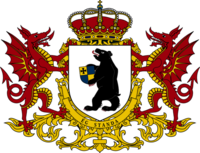Iðnaður Vernd Lögum
 | |
| Althing | |
|---|---|
| An Act to protect the traditional industries of Atlantica, particularly the Timber and Papermaking industries | |
| Territorial extent | Throughout Atlantica |
| Enacted by | Althing |
| Date enacted | 17 January 1969 |
| Enacted by | Referendum |
| Date enacted | 1 February 1969 |
| Introduced by | Lawspeaker Hjörtur Þórirsson |
| Summary | |
| Restricts importation of goods. | |
| Status: Unknown | |
The Iðnaður Vernd Lögum (Atlantican for Industry Protection Law) is a law that heavily restricts importation of goods into Atlantica, banning importation of any paper, timber or (unprotected) fish that can be found in Atlantica, so long as there is not a shortage of any of those goods.
The bill was primarily designed to protect the Atlantican timber, papermaking and fishing industries, which many, following the 1967-1968 General strike, feared would soon collapse, with most Atlantican timber and paper to be imported from other countries. Although the Atlantican timber and papermaking industries are not as strong as they when the bill passed, due to decreased exports, the bill is largely credited with keeping Atlantican timber and paper major Atlantican exports and keeping those industries to be quite strong due to keeping a permanent demand for Atlantican timber and paper, as well as keeping Atlantican fishing strong by preventing fish that are not protected and are found in Atlantica from being imported from other countries. For this reason, the law is often criticised by environmental groups (including the Green Party, Friends of Esquarium and Esquarium First!), but the government has designed a series of heavy protections to prevent overfishing. The bill is supported by most of the members of the Red-Green-Socialist-Alliance (but opposed by the Greens and the FoE) due to its effect of protecting Atlantican Timber and paper workers (as well as fishers) from losing their jobs to Timber and paper workers (and fishers) in other countries, the national syndicalist National Workers' Party and the right-wing Democrats due to the Democrats' strong support of economic nationalism; however, the bill is opposed by the aforementioned Greens and the FoE due to its environmental implications, as well as most members of the Moderate Alliance.